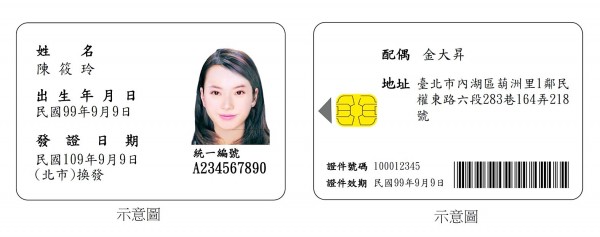《TAIPEI TIMES》 No biometrics for identity cards with chips: minister

A mockup of the new identity card is pictured in a handout photograph. Photo: Provided by the Ministry of the Interior
By Chen Yu-fu, Liu Li-jen and William Hetherington / Staff reporters, with staff writer
New national identity cards with integrated chips proposed by the Ministry of the Interior will not incorporate biometric data, due to information security concerns, Minister of the Interior Yeh Jiunn-rong (葉俊榮) said.
The ministry had initially proposed incorporating retinal or fingerprint scan data into the cards to assist government efforts to digitize records and services, but using biometrics would only be possible with a general consensus from the public, Yeh said, adding that achieving such a consensus was unlikely.
“I personally do not support the incorporation of biometrics into identity cards ... [the system] is just not suitable for Taiwan,” he said.
Department of Household Registration Affairs Director Wanda Chang (張琬宜) said that even with public support, the department would not use biometrics.
The new cards will have the ability to incorporate personal identity verification data, which would be independent of the individual’s personal records, but the function would need to be turned on by cardholders, she said.
The ministry has strict plans to protect privacy and ensure information security, she added.
The new cards would move some information onto the chip to reduce the card’s size, such as the names of the user’s parents, which are printed on current identification cards, Chang said.
However, spousal information would still be printed on the back of the new cards, she added.
The integrated chip is to support active and passive authentication, as well as basic and assisted access functionality, Chang said, adding that they would have laser etchings on the surface to prevent forgery and modification.
Assisted access functionality would require users to enter personal passwords, she said.
National Chiao Tung University computer science professor Lin Ying-ta (林盈達) said the cards should be as small and simple as possible to limit damage in the worst-case scenario of the system being hacked.
National Cheng Kung University Department of Electrical Engineering professor Lee Chung-hsien (李忠憲) said the ministry is taking the right design direction by not incorporating biometric information.
He said spousal information should also be removed from the cards.
“There are a lot of people in modern society who remain single or are divorced. This private information should be protected,” Lee said.
Taiwan Association for Human Rights chairman Weng Kuo-yan (翁國彥) said that despite the ministry omitting biometrics, the design of the new cards must still be carefully examined by the Legislative Yuan before its details are finalized.
Personal information will still be stored on the card, regardless of its simplification, and information security concerns must therefore be scrutinized, he said.
新聞來源:TAIPEI TIMES


















